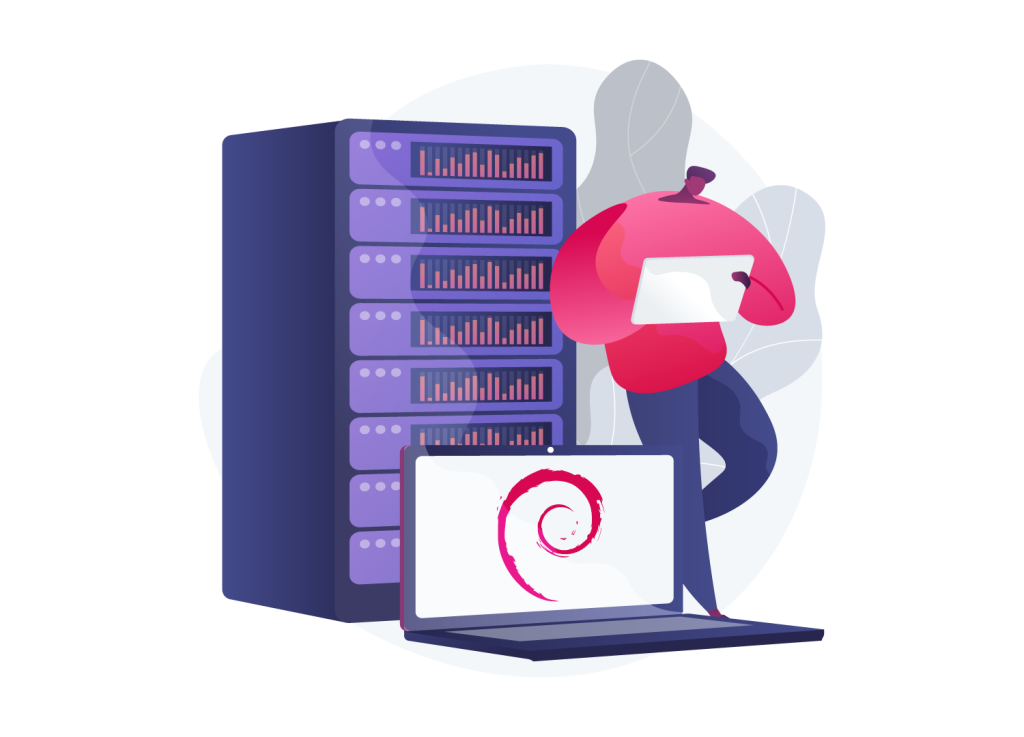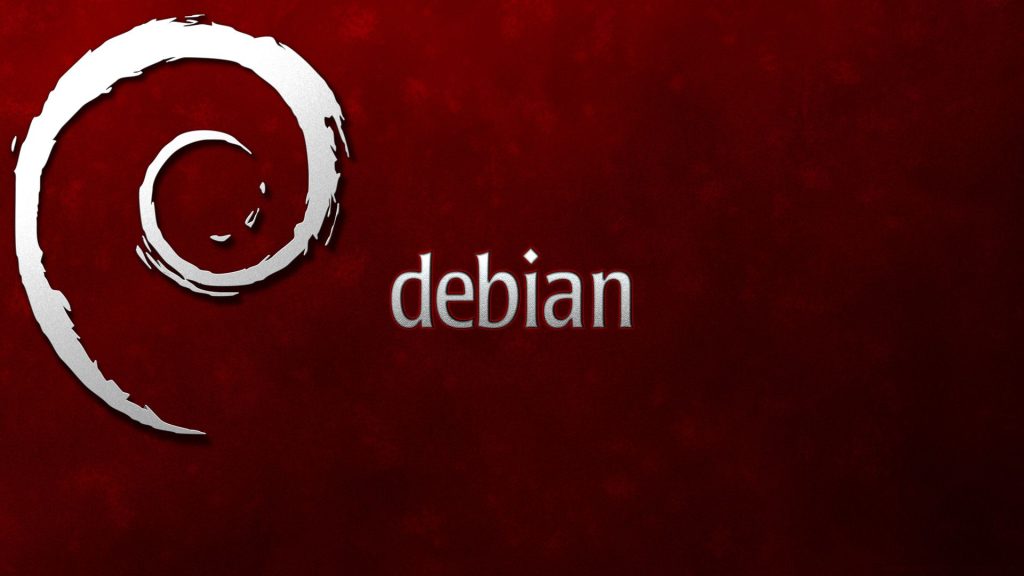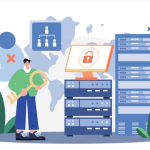Debian OS – Introduction to Debian Linux
Debian is also known as GNU/LINUX, it is a Linux distribution composed of free and open-source packages. Debian, the “Universal Operating System” stands out among the other Linux distributions for its stability and promising features. In this article, we are going to look into the history and features of Debian and understand why it holds the title of “Universal Operating System”. So, without any further trash talk let’s dive into the world of Debian.
Table of Contents
What is Debian?

Debian is a free and open-source operating system (OS) that forms the foundation for various Linux distributions. Known for its commitment to stability, security, and free software principles, Debian is developed by a volunteer community worldwide. The Debian project provides a versatile and customizable platform, offering multiple desktop environments and a vast repository of software packages.
- Its robust package management system, APT (Advanced Package Tool), simplifies software installation, updates, and removal.
- Debian serves as the basis for many other popular Linux distributions, emphasizing a dedication to free software ideals and providing a reliable and flexible computing environment for users ranging from individual enthusiasts to large-scale server deployments.
History of Debian
- Founding by Ian Murdock (1993): Debian was founded by Ian Murdock in August 1993 to create a universal, free, and open-source operating system. The project aimed to provide a robust and reliable platform that could be freely distributed and modified.
- Debian 0.01 (1993): The initial release, Debian 0.01, occurred in 1993. This marked the beginning of Debian’s commitment to being a free and open-source operating system. Even in its early stages, Debian emphasized principles of openness, community collaboration, and a focus on user freedom.
- “Toy Story” Release Naming (1996): Starting from 1996, Debian began naming its releases after characters from the Pixar animated film “Toy Story.” This quirky tradition continues today, with each Debian release being associated with a character from the movie. For instance, Debian 2.0 was named “Hamm.
- “Introduction of APT (1997): In 1997, Debian introduced the Advanced Package Tool (APT), a powerful package management system. APT streamlined the installation, upgrading, and removal of software packages, making it easier for users to manage software on their Debian systems. APT’s efficiency and reliability have contributed significantly to Debian’s reputation as a user-friendly and well-maintained distribution.
Why is it called Debian?
The name Debian is a combination of the first name of the founder and his ex-wife (Debra Lynn) (Debra Lynn + Ian Murdock).
What Language is Debian written in?
Debian is written in 70 different languages since it is committed to flexibility, stability, and community-driven development.
- Plain C
- Bash and POSIX
- Go (golang)
- Perl
- Python
- Ruby
and more are the languages in which Debian is written.
Since portable programming languages are used to write the majority of the software accessible on Debian, the source code can be compiled for a variety of architectures.
Features of Debian
- Open Source: Debian is open source so that, individuals can contribute and improve the the code to make Debain more efficient and secure.
- User Friendly: Debian comes with clean and sleek user interface. Not like windows are flooded with news and unnecessary ads.
- Package Management: Debian allows users to install software and perform operations like updating and removing software using APT. You can see the APT commands above.
- Software Centre: Debain provides a GUI Software Center from where users can install software like vscode, vlc, pycharm, etc.
- Reliability: Debian has a conservative and stable release cycle. Most updates are well-tested before release making sure, that no updates should break the system.
Advantages of Debian OS
Stability: All Debian packages are tested before being included in its repositories. Debian also has a slower release cycle than other distributions, and each version is supported for a long time. So it guarantees a high level of stability.
Security: Debian regularly provides security updates for its open-source software to quickly fix software security bugs and prevent possible vulnerabilities.
An established Linux distribution: Debian is one of the oldest and most established Linux distributions, and many popular distributions such as Ubuntu are based on Debian.
Server compatibility: You can use the original version of Debian on a server without needing a special version or modification. It is a great choice for a Linux VPS.
Open source: being open source is an advantage that users can apply any changes to the operating system.
Strong support: Debian is not just a Linux operating system, this software is produced by hundreds of volunteers worldwide. You can still be part of the Debian community even if you are not a programmer.
Debian is based on community and consensus. Due to the wide range of users, Debian has become a common practice in Linux software. You can find all kinds of software you need on Debian.
Advantages of Debian OS
Debian is one of the most popular and respected Linux distributions, known for its stability, security, and vast software repository. Here are some of the key advantages of using Debian OS:
1. Stability and Reliability
- Debian is renowned for its stability, making it a preferred choice for servers and production environments. The software packages are rigorously tested, ensuring that the system runs smoothly with minimal crashes or bugs.
2. Security
- Debian is known for its robust security. The Debian Security Team actively monitors and addresses security vulnerabilities, providing timely updates and patches. This makes Debian a secure option for both servers and desktops.
3. Vast Software Repository
- Debian has one of the largest software repositories, offering more than 50,000 packages. Users have access to a wide range of applications, tools, and utilities directly from the official repositories, making software installation and management convenient.
4. Package Management System (APT)
- Debian’s Advanced Package Tool (APT) is one of the most efficient package management systems in the Linux world. It simplifies software installation, updates, and management while handling dependencies automatically.
5. Free and Open Source
- Debian is completely free and open-source. It adheres strictly to the principles of free software, ensuring users have full control over their system without any proprietary restrictions.
6. Customizability
- Debian is highly customizable. Users can choose from various desktop environments (GNOME, KDE, XFCE, etc.), configure the system as per their needs, and tailor it to specific use cases, whether for a lightweight desktop or a robust server.
7. Community Support
- Debian has a large and active community that offers extensive support. Users can access forums, mailing lists, and documentation to resolve issues or seek advice. The community-driven nature of Debian ensures regular updates and continuous improvements.
8. Long-Term Support (LTS)
- Debian offers long-term support for its stable releases, which can be a major advantage for those looking for a reliable system that doesn’t require frequent upgrades. This LTS support is particularly beneficial for servers and enterprises.
9. Compatibility and Versatility
- Debian is compatible with a wide range of hardware, from old machines to modern servers. Its versatility allows it to be used for various purposes, including desktops, servers, embedded systems, and development environments.
10. Minimal Resource Usage
- Debian is lightweight and can be configured to run efficiently even on older or low-resource hardware. This makes it an excellent choice for users seeking a performant system with minimal overhead.
Conclusion
Debian’s combination of stability, security, extensive software options, and strong community support makes it one of the most reliable and versatile Linux distributions available. Whether you’re running a desktop, a server, or an enterprise environment, Debian is a solid choice for users seeking a powerful, free, and open-source operating system.

Disadvantages of Debian OS
- Delay in updating stable versions (Debian provides stable versions every 1–3 years)
- Having a slow release cycle and outdated software
- The complexity of the installation and configuration process and the need for more technical knowledge
- Does not support Delta updates such as Delta RPM
Hardware Requirements
1. Minimum Specifications:
- CPU: Pentium 4 or equivalent
- RAM: 512 MB
- Disk Space: 10 GB
2. Preferred Specifications:
- CPU: Multi-core processor (modern architecture)
- RAM: 2 GB or more
- Disk Space: 20 GB or more
Conclusion
However, there is no doubt about the popularity of the Linux Debian distribution. It has evolved immensely over the years, offering huge functionalities and a number of packages for including new technologies. Today, most of the projects are being created using the Debian distribution of Linux. It is one of the secured, stable distributions that has made it easier for the companies who look for long-term support for a specific release.



